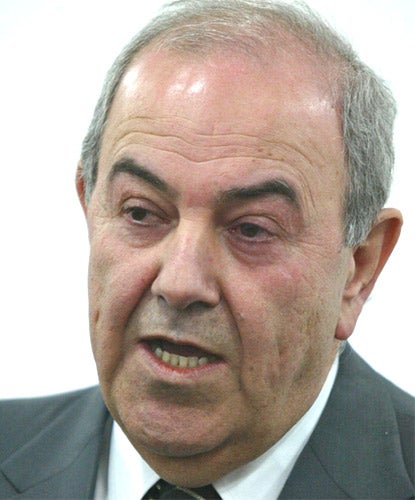Iraq rivals face coalition wrangles

Your support helps us to tell the story
From reproductive rights to climate change to Big Tech, The Independent is on the ground when the story is developing. Whether it's investigating the financials of Elon Musk's pro-Trump PAC or producing our latest documentary, 'The A Word', which shines a light on the American women fighting for reproductive rights, we know how important it is to parse out the facts from the messaging.
At such a critical moment in US history, we need reporters on the ground. Your donation allows us to keep sending journalists to speak to both sides of the story.
The Independent is trusted by Americans across the entire political spectrum. And unlike many other quality news outlets, we choose not to lock Americans out of our reporting and analysis with paywalls. We believe quality journalism should be available to everyone, paid for by those who can afford it.
Your support makes all the difference.The formation of a new coalition government in Iraq will be difficult as rival political groups have all done well enough in the election to demand a share in power.
The Prime Minister Nouri al-Maliki's State of Law bloc is vying with Iyad Allawi, leader of the Iraqiya list, as front runner with the most votes. Mr Maliki is ahead in seven out of 18 provinces, while Mr Allawi is ahead in five.
Voting has been largely along sectarian or ethnic lines, with the Prime Minister ahead in Baghdad and most of the Shia provinces of the south, while Mr Allawi, himself a secular Shia, is winning the Sunni provinces of the north. The Kurdish parties are being returned for Kurdish areas.
The Shia vote has split mostly between State of Law and the Iraqi National Alliance (INA), grouping the Islamic Supreme Council of Iraq (ISCI) and the followers of the Shia cleric Muqtada al-Sadr, with the latter doing particularly well. With nobody strong enough to form a government on their own, a coalition will be necessary, but this will be difficult to create because the main political blocs often have directly opposing agendas.
All votes have still not been counted from the election on 7 March, but the political landscape of Iraq after the poll is beginning to become clearer. Mr Maliki has done well, but possibly not well enough to hold his post, since the Sadrists, who may have as many as 40 seats in the new 325-member parliament, are insisting that he should not head the next government.
Once his allies when he became Prime Minister in 2006, the Sadrists blame him for co-operating with an American drive against them in 2008. Mr Maliki might look to split the INA and seek an alliance with ISCI, which appears to have polled badly.
Mr Allawi has won Sunni but probably not enough Shia votes to be Prime Minister, though the Sunni community, which backed the anti-American insurgency after the invasion of 2003, will want a share in power and the spoils of office.
These are very important in Iraq because of its $60bn in oil revenues and because most well-paid jobs are with the government. Getting a job, from primary school teacher to executive in the oil industry, requires party backing.
The Kurds are likely to retain their crucial role in creating a new government, but would have difficulty in reaching an agreement on a coalition with Mr Allawi because his party has done particularly well among Arabs in the provinces centred on Mosul and Kirkuk, where control is contested between Arabs and Kurds.
After the last election in 2005 it took five months to put together a government, and sharing power after the latest poll will be an equally complicated and lengthy business.
Join our commenting forum
Join thought-provoking conversations, follow other Independent readers and see their replies
Comments